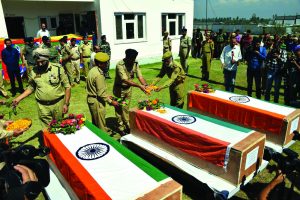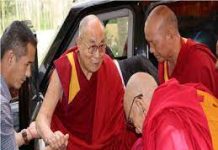 Mounting public ire over the discovery of a mutilated BSF Jawan along the International Border between India and Pakistan on September 18, apart from forcing Government of India to call off the talks within 24 hours of announcing that foreign ministers of India and Pakistan would meet on the sidelines of the United Nations General Assembly in New York, but also exposed Modi government’s flip-flop over talking to Pakistan.
Mounting public ire over the discovery of a mutilated BSF Jawan along the International Border between India and Pakistan on September 18, apart from forcing Government of India to call off the talks within 24 hours of announcing that foreign ministers of India and Pakistan would meet on the sidelines of the United Nations General Assembly in New York, but also exposed Modi government’s flip-flop over talking to Pakistan.
Sequel to this meeting was provided by a letter written by Pakistani Prime Minister, sent on September 14 and handed over to India’s Foreign Office on September 17, in response to congratulatory letter sent to him after his oath taking ceremony by PM Narendra Modi. In his letter of September 14, the Pak PM had reportedly expressed his desire to “peacefully resolve all outstanding issues, including the Jammu & Kashmir dispute, to bridge differences and achieve a mutually beneficial outcome.
Siachen and Sir Creek also need close attention to move towards resolution.” While confirming Pakistan’s request for meeting between the foreign ministers of the two countries, India’s foreign office also confirmed India’s participation in the SAARC council of ministers meeting to be held on September 27, along the sidelines.
Forced by the mounting public wrath over frequent incidents of mutilation of the bodies of Indian Jawans, India was on September 21 left with no option but to call off the scheduled talks with Pakistan in New York just within 24 hours of accepting Pakistan’s talks offer, by saying, “The latest brutal killing of our security personnel by Pakistan-based entities and the recent release of a series of 20 postage stamps by Pakistan glorifying a terrorist (Burhan Wani) and terrorism confirm that Pakistan will not mend its ways.”
Pakistan has been resorting to pressure tactics against India in J&K for over three decades now by adhering to two-pronged strategy: by sending armed militants to perpetrate terrorist violence to destabilise J&K thereby compelling India to accept its terms of negotiations; and harping on resuming dialogue process to showcase the world that Islamabad is for a negotiated settlement of outstanding problems with India.
Some experts ascribe to the view that the somewhat liberal Kashmiri movement has taken on a more religious outlook with Pakistan’s direct involvement.
While lamenting that Pakistan’s Kashmir policy is based on double standards and hypocrisy in terms of backing right to self-determination for Indian side of the Kashmir and suppressing Kashmiris in PoK, many critics opine that Pakistan’s involvement in Kashmir will always jeopardize the issue owing to Islamabad’s international recognition as an alleged Islamist hub which is counterproductive for the Kashmir plight.
Many analysts point to the presence of a ‘deep state’ within Pakistan, which is controlled by Pakistan Army and ISI. This deep state strikes as and when India and Pakistan seek to improve relations. When the late PM Vajpayee took the bus to Lahore in early 1999, the deep state responded with the Kargil attack masterminded by the Pakistan Army.
The deep-state policy sought to undermine the Vajpayee government’s efforts to make peace with Pakistan by detonating a car bomb near the Jammu and Kashmir Assembly building in October 2001 and it was followed by the attack on Parliament House in December that brought the two countries to the brink of war. The UPA government’s efforts in 2008 in seeking to build on the dialogue on Kashmir with the new government in Islamabad, the deep state responded with the horrific Mumbai attack.
Installation of Modi regime in New Delhi has also witnessed the subversive machination of the deep state. PM Modi’s sudden visit to Lahore on Christmas Day 2015 to wish Happy Birthday to Nawaz Sharif, was responded by the deep state a week later, with the Pathankot attack. Modi regime has witnessed frequent increase in violation of the truce agreement on both LoC and International Border since 2014.
The data released by Ministry of Union Home Ministry makes it discernible that in 2014, the number of border violations stood at 583 and the number of violent incidents reported stood at 222, along with 47 security force personnel killed, 29 civilians along with 110 terrorists were also killed during this period.
The number of border violation incidents which stood at 499 in 2016 grew to 771 in 2017. This period also saw spurt in number of violent incidents from 322 in 2016 to 342 in 2017 with corresponding increase in the deaths of security personnel, civilians and the terrorists. It is further revealed from this data that until the end of July-2018, the number of border violation incidents by Pakistan recorded a phenomenal increase by reaching at 1, 432, killing 59 security personnel and civilians. This is apart from frequent incidents of mutilating the bodies of Indian security personnel in gruesome manner.
Govt’s response
Data about border violations, violent terrorist incidents and deaths of security personnel and civilians along with gruesome mutilation of our jawans don’t bode well with PM Modi’s public image as he projects and sees himself, as being hard-headed and focused, especially in his dealing with Kashmir and Pakistan. Undoubtedly, Modi government came to power with a lot of tough talk on Islamabad; nevertheless, in practical terms it followed a workmanlike policy of meeting with Nawaz Sharif in Nepal, and followed by the Christmas Day love-fest in December 2015, to be rewarded with Pathankot tragedy.
Modi government’s tough response after Pathankot, which inter alia included: decrying Islamabad in international forums and capitals and responding to border clashes with disproportionate force evidently failed to yield the desired result. There was neither any significant reduction in Pakistan’s cross border attacks nor in the frequency of violent incidents within J&K. One fails to understand Modi government’s logic behind its recent attempts to reach out to Pakistan. While pointing out that government’s approach is dictated by the fact it is focusing on the ensuing elections, some critics opine that admittedly denouncing Pakistan certainly brings in votes, especially in the Hindi heartland, there is always the probability of the situation going out of hand, as it has happened.
Media reports indicate that recent years have witnessed increasing support of some segments of Kashmiri people for the cause of the separatists and they have often come out in droves to protest against government’s rule and military operations in the state.
The disturbing reports of Kashmiri youth, who comprise about 60 percent of Kashmir’s male residents under the age of 30, and 70 percent below the age of 35, being attracted towards militancy, especially in the wake of government’s inability to provide them jobs, is a matter of serious concern for the government and the nation as a whole.
Way ahead
Separatism in Kashmir is a complex problem that calls for multipronged approach based on consensus to be achieved with the involvement of all stakeholders. Creating a secure, stable and peaceful ambience in the Valley is a sine qua non for tackling socio-economic problems of Kashmiri people. While keeping the option of talks with Pakistan open, New Delhi needs to be prepared to face disruptive onslaughts of Pakistan’s deep-state. Modi government’s claim of “surgical strikes” launched on September 29, 2017, are often touted as aiming at deterring Pakistan from sending armed militants across India have reportedly failed to realize the desired objectives as can be evidenced from developments in the last and current years.
Unabated Pakistani shelling and attacks along the LoC resulting in a heavy loss of life of civilians and security personnel, attack on an Indian army formation in Nagrota on November 29, 2017, killing seven soldiers, attack on the CRPF camp on the last day of December 2017 killing five CRPF jawans by Jaish-e-Muhammad militants and recent incidents of mutilating bodiesof our jawans etc., are sufficient evidence of flip-flop policy of Modi government that needs to be corrected.
While calling upon Indian government to adhere to long term steps aimed at de-escalating violence in Kashmir, one expert has suggested restoration of the Kashmiri people’s trust in state’s democratic institutions and address the rise of religiously-motivated nationalism, especially in religiously and ethnically diverse parts of Kashmir along with providing dignified means of livelihoods to the Kashmiri youth to bring them back into the mainstream of development.
letters@tehelka.com












